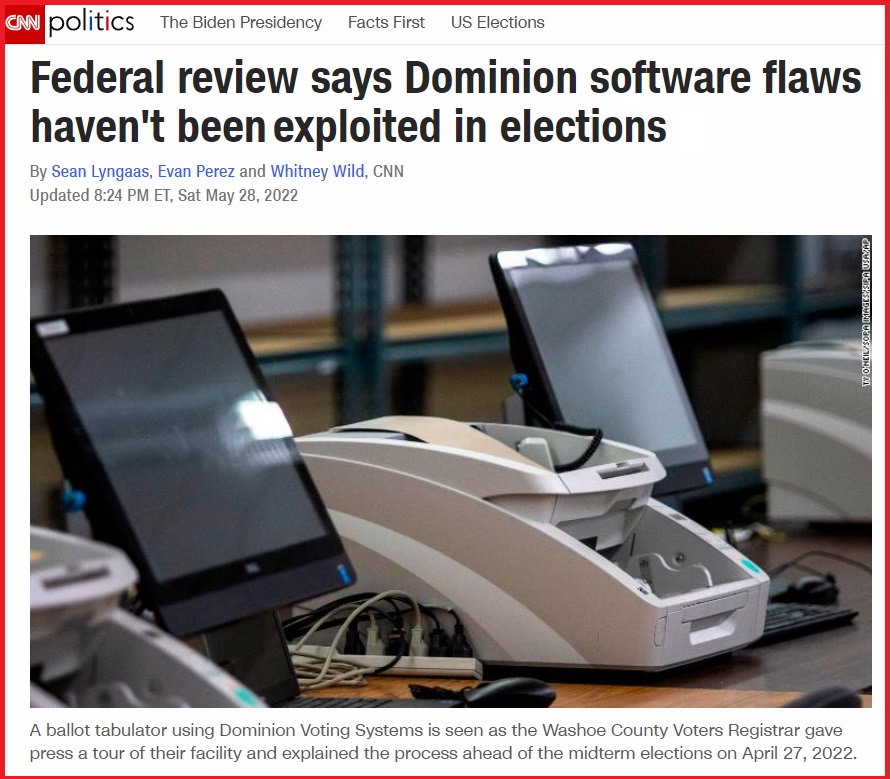
The timing is not coincidental. A 100-page report on electronic voting systems, by University of Michigan computer scientist J. Alex Halderman, remains under seal in a federal court in Atlanta as an outcome of election integrity lawsuits surrounding the Dominion voting system. That report is rumored to be released soon, perhaps as early as this week.
 In what appears to be a proactive move to get out ahead of identified voting system irregularities specific to the electronic voting systems, the Dept of Homeland Security, Cybersecurity and Infrastructure Security Agency (DHS-CISA), updated the election page on their website [SEE HERE] under the “Rumor Control” section. DHS made the update on May 27, 2022, last week.
In what appears to be a proactive move to get out ahead of identified voting system irregularities specific to the electronic voting systems, the Dept of Homeland Security, Cybersecurity and Infrastructure Security Agency (DHS-CISA), updated the election page on their website [SEE HERE] under the “Rumor Control” section. DHS made the update on May 27, 2022, last week.
The very next day, May 28, 2022, The Washington Post produces an article [SEE HERE] describing an upcoming DHS-CISA 5-page memorandum that is in the process of being sent to the states ahead of a public release.
With the WaPo being the outlet of choice for the intelligence community & security state, it appears they received an advanced copy to help establish an early response effort.
Within The Post article, “there are nine flaws affecting versions of the machine called the Dominion Voting Systems Democracy Suite ImageCast X, according to a copy of an advisory prepared by CISA and obtained by The Washington Post.” The article then goes immediately to downplay the problems. “The flaws, many of which are highly technical and which mostly stem from machine design as opposed to coding errors, generally require an attacker to have physical access to the devices or other equipment used to manage the election, CISA said.”
[…] CISA’s five-page advisory is based in part on Halderman’s 100-page report, which remains under seal in a federal court in Atlanta. The advisory is expected to be released next week after officials in all 50 states are notified.
The WaPo article is filled with ‘nothing to see here, move along – move along,’ verbal engineering.
 CNN then picks up the baton from the Washington Post, and they too tell their audience not to worry about any pesky evidence of election system vulnerabilities. The professionals in charge of things have assured us there’s no problems and everything is fine. After all, it would be far too difficult, and too many people would be involved, for there to be actual tampering and fraud in the use of the electronic systems.
CNN then picks up the baton from the Washington Post, and they too tell their audience not to worry about any pesky evidence of election system vulnerabilities. The professionals in charge of things have assured us there’s no problems and everything is fine. After all, it would be far too difficult, and too many people would be involved, for there to be actual tampering and fraud in the use of the electronic systems.
(Via CNN) – Federal cybersecurity officials have verified there are software vulnerabilities in certain ballot-marking devices made by Dominion Voting Systems, discovered during a controversial Georgia court case, which could in theory allow a malicious actor to tamper with the devices, according to a draft analysis reviewed by CNN.
The vulnerabilities have never been exploited in an election and doing so would require physical access to voting equipment or other extraordinary criteria standard election security practices prevent, according to the analysis from the US Cybersecurity and Infrastructure Security Agency.
But because the subject is Dominion voting equipment, which has been the target of conspiracy theorists who falsely claim there was large-scale fraud in the 2020 election, federal and state and local officials are bracing for election deniers to try to weaponize news of the vulnerabilities ahead of midterm elections.
“While these vulnerabilities present risks that should be promptly mitigated, CISA has no evidence that these vulnerabilities have been exploited in any elections,” reads the draft CISA advisory, which the agency shared in a briefing with state and local officials on Friday. (read more)
For a group of government bureaucrats that are so confident there’s no ‘there, there‘, they sure are putting a lot of energy into delivering all the talking points ahead of the actual election reports and state advisories.
Meanwhile, Suspicious Cat remains, well, suspicious…
